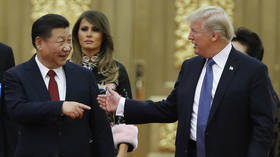EU teases 11th round of Russia sanctions

The EU is putting together the 11th package of anti-Russian sanctions in response to the Ukraine conflict, EU commissioner for financial stability, financial services and capital markets Mairead McGuinness confirmed on Friday.
“We will have another package,” McGuinness told CNBC while attending an International Monetary Fund meeting in Washington, DC. She insisted that the previous ten rounds of sanctions were having an impact on Moscow’s “war machine” but that more was needed.
“Our information is that the sanctions are working, and we will be doing more but we need to look at full implementation,” McGuinness explained. “What Russia is being deprived of is both the finance and the technologies to reinvent their war machine, and they are having problems on the battlefield.”
The EU also intends to look at ways to prevent Russia from circumventing the embargo “with its pals globally,” said McGuinness. Rather than finger-pointing at entire countries, as the US has done, the bloc wants to pressure “individuals and entities” instead. To that end the EU has been working with the US, Canada and Japan to gather intelligence on Russian “evasion” efforts, she said.
The US and its allies imposed sweeping trade and finance restrictions against Moscow and sent hundreds of billions of dollars in weapons and ammunition to Kiev – while insisting they weren’t involved in the conflict. However, contrary to their hopes of breaking the Russian economy and “reducing the ruble to rubble,” in the words of US President Joe Biden, the sanctions have hurt the EU the most, with inflation and energy shortages crippling members’ economies.
Foreign companies that have left Russia or scaled back their activities are estimated to have lost over $200 billion by October last year. The non-food retail sector alone had forfeited $2 billion, according to a recent analysis.
An attempt by the US and the EU to impose a price cap on Russian crude oil exports has also backfired, as Moscow simply stopped selling oil to any “unfriendly” states and ramped up deliveries elsewhere. This has left the US and its allies paying higher prices for oil from re-exporters like India.














